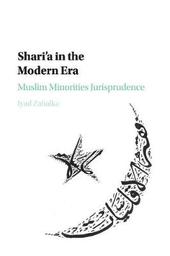
|
Shari'a in the Modern Era: Muslim Minorities Jurisprudence
Paperback / softback
Main Details
| Title |
Shari'a in the Modern Era: Muslim Minorities Jurisprudence
|
| Authors and Contributors |
By (author) Iyad Zahalka
|
| Physical Properties |
| Format:Paperback / softback | | Pages:223 | | Dimensions(mm): Height 230,Width 153 |
|
| Category/Genre | Islam |
|---|
| ISBN/Barcode |
9781107535084
|
| Classifications | Dewey:340.59 |
|---|
| Audience | | Professional & Vocational | |
|---|
|
Publishing Details |
| Publisher |
Cambridge University Press
|
| Imprint |
Cambridge University Press
|
| Publication Date |
11 May 2017 |
| Publication Country |
United Kingdom
|
Description
Written by the Qadi (judge) of the Shari'a Court of Jerusalem and former director of the Shari'a Court system in Israel, this book offers a unique perspective on the religious law of Muslim minorities living in the West. Specifically, it explores the fiqh al-aqalliyyat doctrine of religious jurisprudence developed by modern Islamic jurists to resolve the challenges of maintaining cultural and religious identity in majority non-Muslim societies. The author examines possible applications across numerous cultural and geographical contexts, answering such questions as: what are the rules for assuming political and public roles, and should one deposit money that incurs interest? Building on a growing scholarship, this book aims to resolve points of view and facets of religious law that have been neglected by previous studies. Accessibly written, Shari'a in the Modern Era is designed to promote cross-cultural understanding among readers of all faiths.
Author Biography
Iyad Zahalka is the Qadi (judge) of the Shari'a Court of Jerusalem as well as a lecturer at the Hebrew University of Jerusalem, Tel Aviv University, and Bar-Ilan University, Israel. Drawing on his experience as the former director of the Israeli Shari'a Court system, Zahalka's work focuses on the tension between minority identity and integration in Western society. He is the author of Guide to Shari'a Law (2008) and Shari'a Courts between Identity and Adjudication (2009).
|